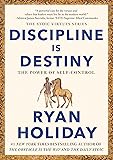Highlights from "Discipline Is Destiny"
By Ryan Holiday

Aristotle described virtue as a kind of craft, something to pursue just as one pursues the mastery of any profession or skill. "We become builders by building and we become harpists by playing the harp," he wrote. “Similarly, then, we become just by doing just actions, temperate by doing temperate actions, brave by doing brace actions.” Virtue is something we do. It's something we choose.
“When a man can control his life, his physical needs, his lower self," Muhammad Ali would later say, "he elevates himself."
Of course, it's not exactly fun to wake up early. Even the people who have reaped a lifetime of benefits from it, still struggle with it. You think you're not a morning person? Nobody is a morning person.
The pleasure of excess is always fleeting. Which is why selfdiscipline is not a rejection of pleasure but a way to embrace it. Treating our body well, moderating our desires, working hard, exercising, hustling-this is not a punishment. This is simply the work for which pleasure is the reward.
even if they weren't, even if they were harmless, why should we take orders from our belly or our crotches. or the device that seems almost physically connected to us at this point? The body can't be in charge. Neither can the habit. Don We must be the boss.
"The 'genius' hangs around his laboratory day and night," Edison said. “If anything happens he's there to catch it; if he wasn't, it might happen just the same, only it would never be his."
We don't rise to the occasion, we fall to the level of our training.
Always and forever, the reward is the work. It is a joy itself. It is torture and also heaven-sweaty, wonderful salvation.
Success breeds softness. It also breeds fear: We become addicted to our creature comforts. And then we become afraid of losing them. Seneca was no Cato day to day, but he knew from his practice, that he could be if he had to. By seeking out discomfort, we toughen ourselves up
Discipline is how we free ourselves. It is the key that unlocks the chains. It is how we save ourselves. We choose the hard way... because in the long run, it's actually the only way.
We pause. We gather ourselves. We put it up to the light. We ask: Is this true? Is it actually as upsetting as it feels? As scary or annoying as I first thought? Don't let fear or anxiety or prejudice decide. Don't let your temper decide. Let your temperament take over. Or rather, let the temperament you're striving to have, that you know your position demands you have, do its work.
Losing is not always up to us ... but being a loser is. Being a quitter is. Saying, "Ah, what the hell, does it even matter?" That's on us. Throwing in the towel on a fight we've clearly lost is one thing, throwing in the towel on fighting, on your standards, from that point forward? Now you've been more than beaten, you've been defeated.